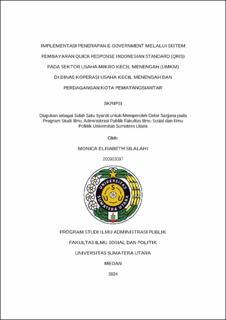Implementasi Penerapan E-Government Melalui Sistem Pembayaran Quick Response Indonesian Standard (Qris) pada Sektor Usaha Mikro Kecil Menengah (Umkm) di Dinas Koperasi Usaha Kecil Menengah dan Perdagangan Kota Pematangsiantar
Implementation of E-Government Application Through the Quick Response Indonesian Standard (QRIS) Payment System in the MSME Sector At the Cooperatives, Small And Medium Enterprises And Trade Service of Pematangsiantar City

Date
2024Author
Silalahi, Monica Elisabeth
Advisor(s)
Ginting, Wiro Oktavius
Metadata
Show full item recordAbstract
In the era of digitalization, the Indonesian government continues to encourage the application of technology to facilitate various public services, including in the financial sector. One of these innovations is the implementation of the Quick Response Indonesian Standard (QRIS) payment system as part of e-government.
This study aims to describe and analyze the implementation of e-government through the QRIS payment system in the MSME sector in Siantar Marihat District, Pematangsiantar City. This research uses descriptive research methods with a qualitative approach, data collection techniques namely interviews, observation and documentation. Data were collected through in-depth interviews with UMKM actors, Cooperatives Office staff, and other related parties. In addition, this study also utilizes direct observation of the implementation of QRIS in the field and relevant documentation. This approach is used to obtain a comprehensive picture of the obstacles, opportunities, and steps that have been taken by the government in maximizing the use of QRIS. The data and information collected were then analyzed based on five indicators used to measure the success and achievement of implementation, namely the Van Meter and Van Horn policy implementation indicators which are stated through policy targets, resources, communication, social, economic and political conditions, characteristics of implementing organizations.
The results of the study show that the implementation of QRIS in the UMKM sector in Pematangsiantar has had a positive impact in increasing transaction efficiency and accelerating the payment process. However, this implementation has not been fully optimized due to limitations in terms of knowledge and technological skills among UMKM actors. In addition, increased socialization and training from the government is still needed so that the implementation of QRIS can run more effectively and evenly. Therefore, this study recommends a more proactive policy in expanding access to technology and increasing awareness and education in the UMKM sector.
Collections
- Undergraduate Theses [1936]
